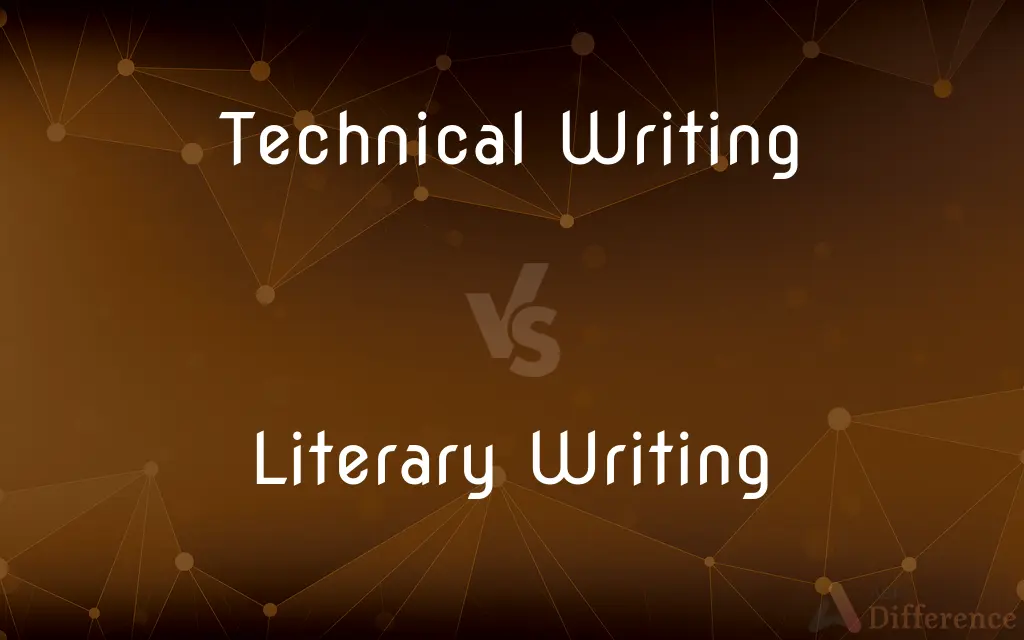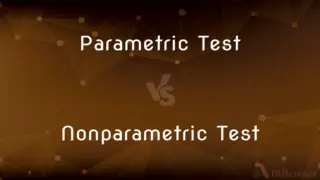Technical Writing vs. Literary Writing — What's the Difference?
Edited by Tayyaba Rehman — By Fiza Rafique — Published on December 10, 2023
Technical Writing conveys specific, factual information; Literary Writing expresses artistic, imaginative content.

Difference Between Technical Writing and Literary Writing
Table of Contents
ADVERTISEMENT
Key Differences
Technical Writing is a method of crafting content that presents factual, specific, and clear instructions or explanations. It's meant for a specific audience with a particular goal in mind, often to instruct or inform. Literary Writing, on the other hand, delves into the world of creativity and art. It involves storytelling, poetry, and other forms of artistic expression that tap into emotions, experiences, and the human condition.
In Technical Writing, precision is paramount. Every word and sentence is chosen to convey a precise meaning without ambiguity. Clarity is the ultimate goal, and there's little room for interpretation. On the contrary, Literary Writing encourages interpretation. It often uses metaphors, symbolism, and a host of other literary devices to enrich the text and evoke emotions and thoughts in the reader.
While Technical Writing is often seen in manuals, how-to guides, and academic papers, it always aims to be direct and to the point. Its primary concern is to ensure the reader understands a concept or a process. Literary Writing, however, appears in novels, short stories, and poems. It's less about direct communication and more about immersion, taking readers on a journey, whether emotional, intellectual, or both.
The formats and structures differ significantly as well. Technical Writing often follows a strict format, with headings, bullet points, and diagrams. It is utilitarian in design. Literary Writing, conversely, enjoys freedom in structure. It can be a lengthy prose, a short poem, or an abstract piece, all depending on the writer's intention and style.
Comparison Chart
Purpose
Informs or instructs.
Entertains or evokes emotion.
ADVERTISEMENT
Language
Precise and unambiguous.
Artistic and metaphorical.
Structure
Often rigid and organized.
Fluid and free-form.
Audience Interpretation
Little to none.
Encouraged.
Examples
Manuals, how-to guides.
Novels, poetry.
Compare with Definitions
Technical Writing
Technical Writing often uses visuals to enhance comprehension.
With its charts and diagrams, the research paper showcased effective Technical Writing.
Literary Writing
Literary Writing delves into human emotions, experiences, and narratives.
His short story, capturing the struggles of love, epitomizes deep Literary Writing.
Technical Writing
Technical Writing is a form of writing that provides clear instructions or information.
The manual on how to operate the machine is an example of Technical Writing.
Literary Writing
Literary Writing often uses metaphorical and symbolic language.
The poem's use of the river as a metaphor for life is classic Literary Writing.
Technical Writing
Technical Writing breaks down complex topics into understandable content.
The software documentation made the program easy to use, thanks to good Technical Writing.
Literary Writing
Literary Writing is an artistic form of expression through words.
Her novel, filled with vivid imagery, is a beautiful example of Literary Writing.
Technical Writing
Technical Writing uses straightforward language without ambiguity.
The user guide's Technical Writing made setting up the device a breeze.
Literary Writing
Literary Writing allows for open interpretation by the reader.
The abstract tale, leaving readers with more questions than answers, showcased the beauty of Literary Writing.
Technical Writing
Technical Writing is audience-specific, aiming to meet the needs of a particular group.
The FAQ section for the product was a result of targeted Technical Writing for new users.
Literary Writing
Literary Writing is characterized by its unique style and voice.
Her distinctive voice in her essays is what sets her Literary Writing apart.
Common Curiosities
What is the primary goal of Technical Writing?
The primary goal of Technical Writing is to inform or instruct the reader in a clear and concise manner.
Can Technical Writing be creative?
Yes, Technical Writing can have creative elements, but its main focus remains clarity and precision.
Why do authors use Literary Writing?
Authors use Literary Writing to express emotions, tell stories, and evoke reactions from readers.
Is audience knowledge essential for Technical Writing?
Yes, understanding the audience's knowledge level ensures the Technical Writing is appropriately targeted.
Which professions primarily use Technical Writing?
Engineers, scientists, IT professionals, and technical educators are among those who often use Technical Writing.
Can someone specialize in both Technical Writing and Literary Writing?
Yes, while they require different skill sets, it's possible for someone to excel in both areas.
Can a piece have both Technical Writing and Literary Writing?
While rare, some pieces, like creative non-fiction, might blend elements of both.
Why is clarity crucial in Technical Writing?
Clarity ensures the reader understands the information or instruction without ambiguity.
How is Literary Writing different from Technical Writing?
While Technical Writing focuses on clarity and directness, Literary Writing emphasizes artistry, emotion, and interpretation.
What tools do Technical Writers often use?
Technical Writers frequently use software like Microsoft Word, Adobe FrameMaker, and MadCap Flare.
Is brevity a characteristic of Technical Writing?
Brevity is appreciated in Technical Writing, but clarity is the primary goal, even if it requires length.
Do all novels fall under Literary Writing?
Most novels are examples of Literary Writing, but the term encompasses more, including poetry and plays.
How do literary devices feature in Literary Writing?
Literary devices, like metaphors and allegories, enrich Literary Writing, adding depth and layers of meaning.
Why is interpretation encouraged in Literary Writing?
Interpretation allows readers to connect personally with the piece, making the experience more immersive and personal.
Does Literary Writing always follow a set structure?
No, Literary Writing often enjoys freedom in structure, varying based on the writer's intent.
Share Your Discovery
Previous Comparison
RTV vs. Silicone
Next Comparison
Parametric Test vs. Nonparametric TestAuthor Spotlight
Written by
Fiza RafiqueFiza Rafique is a skilled content writer at AskDifference.com, where she meticulously refines and enhances written pieces. Drawing from her vast editorial expertise, Fiza ensures clarity, accuracy, and precision in every article. Passionate about language, she continually seeks to elevate the quality of content for readers worldwide.
Edited by
Tayyaba RehmanTayyaba Rehman is a distinguished writer, currently serving as a primary contributor to askdifference.com. As a researcher in semantics and etymology, Tayyaba's passion for the complexity of languages and their distinctions has found a perfect home on the platform. Tayyaba delves into the intricacies of language, distinguishing between commonly confused words and phrases, thereby providing clarity for readers worldwide.










































